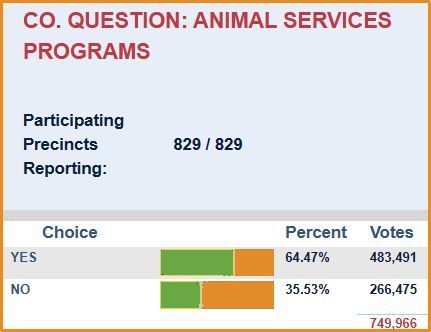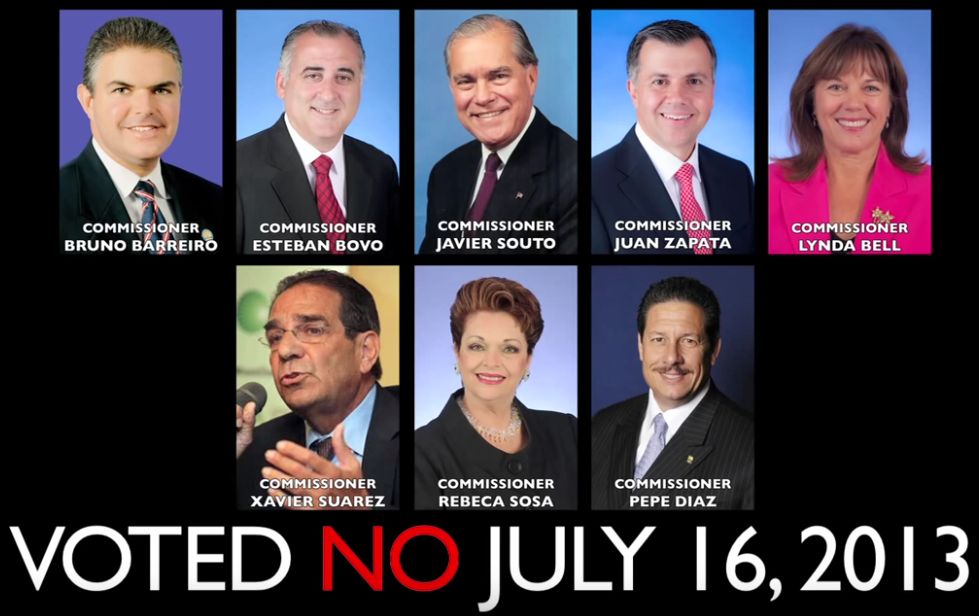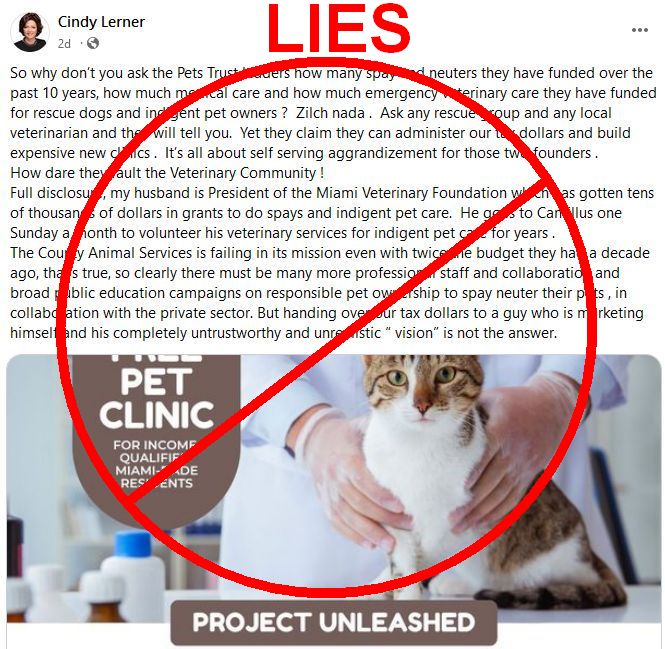Updated September 11, 2023.
Let’s set the record straight. Recently, lies and negative accusations about us and our organization have been spreading in the press and on social media, especially these two lies: 1) the money would go to or be controlled by our organization and 2) the money would be used to build lavish spay/neuter centers. These are simply false. But they are effective in bolstering negative sentiments, especially when they originate from The Miami Herald and a local politician with a large following who is the wife of a prominent veterinarian and President of the Miami Veterinary Foundation. We challenge those who spread lies to show us where these lies can be found in the written Pets’ Trust Plan.
Reviewing our history may explain the reason for these lies.
History
 In late 2011, Alex Muñoz, the then Director of Miami-Dade Animal Services, brought some animals to an adoption event as part of a Kendall Federation public meeting. There, Michael Rosenberg started asking questions and learning about the animal overpopulation problem. His lightbulb moment came soon after.
In late 2011, Alex Muñoz, the then Director of Miami-Dade Animal Services, brought some animals to an adoption event as part of a Kendall Federation public meeting. There, Michael Rosenberg started asking questions and learning about the animal overpopulation problem. His lightbulb moment came soon after.
The idea that stray, homeless and abandoned animals are a community-wide problem, and therefore everyone in the community should share the costs associated with addressing the problem.
Michael asked Alex Muñoz, the County’s top stray animal expert: What would it take to seriously get control over the animal overpopulation problem? Mr Muñoz estimated it would take $20 million per year, for several years in a row, to be able to perform 100,000 spay/neuter surgeries a year while simultaneously increasing adoption and education programs.
After sharing the idea individually with each of the 13 County Commissioners in 2012, we convinced them all to support the inclusion of a ballot question for the November 6, 2012 election to ask voters if they would be willing to pay a small property tax increase of approximately $20 per house per year to fund our idea. Yes, all 13 Commissioners agreed! (Ten years later we estimate the tax would now average only $11 per house per year.)
Focused on the upcoming November election, in February 2012 Yvonne Grassie, Michael Rosenberg, Lindsay Gorton and and Rita Schwartz formed Pets’ Trust Miami, Inc., a Florida Not For Profit Corporation and 501(c)(3) charitable organization founded with the specific purpose:
TO EDUCATE THE PUBLIC ABOUT THE BENEFITS OF A NEW PROPERTY TAX TO FUND A TRUST TO PAY FOR SPAY/NEUTER AND EDUCATION PROGRAMS TO BENEFIT ANIMALS AND THE COMMUNITY IN MIAMI-DADE COUNTY.
Once official, we campaigned hard to spread our message and ask voters to approve a small tax for our animals. Directed by the Board of County Commissioners (BCC) the County Attorneys wrote the ballot question, not us. (A hint of things to come: Who wrote the ballot question becomes important when we were later accused of writing it ourselves in such a way to deceive voters and guarantee its passing. Politics.)
Before the vote, to expose the problem to the community Michael Rosenberg spent 48 hours in a cage at the Animal Services Department. Michael Putney from WPLG Channel 10 interviewed Michael while he was in the cage. Watch the interview here:
 It was put on the ballot, and on November 6, 2012 about 500,000 people—two thirds of the voters, said YES!
It was put on the ballot, and on November 6, 2012 about 500,000 people—two thirds of the voters, said YES!
Since Miami-Dade County does things on a fiscal year from October 1st to September 30th of the next calendar year, we had to wait until the summer of 2013 when the BCC would go through several meetings to set the budget that would begin October 1, 2013. So between the November 6, 2012 voter mandate and June 4, 2013, The Board of Directors of Pets’ Trust Miami, Inc. (Michael Rosenberg, Lindsay Gorton, Rita Schwartz, Yvonne Grassie, Esq. and Sara Pizano, DVM) worked with 32 national experts to create the Pets’ Trust Plan of Action, a simple 11-page document that defined exactly how the Pets’ Trust programs would be managed. This Plan was submitted to the BCC for final implementation.
With the voter mandate and all 13 Commissioners on our side, what could go wrong?
VETERINARIANS KILLED the Pets’ Trust Plan
What went wrong was the greed of local veterinarians who objected to funding the Pets’ Trust Plan saying it would cut into their revenue. Why would animal owners pay retail rates to veterinarians to have their pets spayed or neutered when a low-cost option would be available? What the veterinarians didn’t offer was how they would perform pro-bono sterilization surgeries on 100,000 animals per year, mostly stray cats and dogs. (They were short-sighted; had they supported funding the Pets’ Trust Plan, the County could have given much of the money to the veterinarians to perform the work.) The veterinarians also didn’t explain how they stood by over 30 years knowing over 600,000 healthy animals were killed at the animal shelter. Where were their voices during that slaughter?
 So politics happened, and on July 16, 2013, eight of the 13 County Commissioners sided with the veterinarians and voted “No” to the Pets’ Trust Plan. 500,000 voters said yes, eight Commissioners said no, and the ruling was that the nos had it. The Plan was killed. It was killed by the veterinarians—the professionals in our community who are supposed to care the most for animal welfare.
So politics happened, and on July 16, 2013, eight of the 13 County Commissioners sided with the veterinarians and voted “No” to the Pets’ Trust Plan. 500,000 voters said yes, eight Commissioners said no, and the ruling was that the nos had it. The Plan was killed. It was killed by the veterinarians—the professionals in our community who are supposed to care the most for animal welfare.
~ ~ ~ ~ ~ ~
Ten years later only Rita Schwartz and Michael Rosenberg remain as officers of Pets’ Trust Miami, Inc. They and a few volunteers continue to advocate for the Pets’ Trust Plan and its funding.
Recent Lies
Following an August 12, 2023 Peaceful Protest organized not by us, but by other animal activists, regarding the County’s use of its old Medley shelter, The Miami Herald published a misleading editorial that implied money would be given to us. That’s not true.
Then we saw social media posts spreading lies, lies that originated from veterinarians ten years ago. And coincidentally, Cindy Lerner, wife of the President of the Miami Veterinary Foundation, seemed to be the recent source of these two lies: 1) the money goes to Rita and Michael and 2) the money will be used to build lavish spay/neuter centers. These statements are utter hogwash; untrue; ridiculous. But they sure are effective in creating doubt.

To those who continue to spread these lies, we challenge you to show us where in the written Plan it specifies that any money goes to Pets’ Trust Miami, Inc. or any money is proposed to construct new brick and mortar facilities.
All these lies do is try to stop additional, voter-approved funding from helping to control animal overpopulation and reducing animal suffering.
We understand the greedy motivation of the veterinarians—they made that clear in 2013. But we can’t understand why the Miami Herald would have any reason to mislead; at least they agreed to publish our rebuttal.
If you can’t convince your veterinarian to support the Pets’ Trust Plan, then maybe you should consider finding one who does.
To directly refute these lies
The Plan specifies that a Pets’ Trust Board of Directors (PTBOD) also referred to as an Advisory Board, be created by the BCC. The PTBOD will be made up of 13 volunteers who will decide how best to spend the money. Yes, the Plan does specify that one member of the PTBOD will represent Pets’ Trust Miami, Inc., but only one of the 13. The remaining 12 will include two from Miami-Dade Animal Services; representatives for the BCC, Mayor’s office, The Cat Network, South Florida Veterinary Medical Association, Humane Society and the SPCA. Also an animal shelter medicine expert, a CPA, an attorney and one additional member from a local rescue organization. These 13 people will be approved by the BCC. See Section IV. of the Plan. Additionally, the Plan specifies an Oversight Board, completely under the control of the BCC, “to monitor the PTBOD’s finances, including the allocation of funds”. See Section V. of the Plan.
The 32 experts who crafted the Plan proposed that the $20 million annual budget be allocated to various programs as shown here. But that’s just a recommendation. The final allocation of funds is up to the PTBOD with support of the BCC through their Oversight Board. The money always stays with the County and is paid directly from the County to providers of goods and services.
Another social media group has criticized Pets’ Trust Miami, Inc. for not supporting recently-suspended Animal Services Director Bronwyn Stanford. We have no position on Ms. Stanford.
Our only concern and focus is to convince the BCC to approve additional funding for an independent group of volunteers (the PTBOD) to work on reducing animal overpopulation. We are not advocating for additional funding for the County Animal Services department because they have proven that tripling their budget in the past decade has made no change in their performance. See the history of their Budget and Results here.
We advocate for a separate group of volunteers to direct how a separate source of funds can be used to reduce animal overpopulation, and lessen the burdens on the County’s shelter and the many rescue groups who care for animals that the shelter refuses to accept.
~ ~ ~ ~ ~ ~
Programs
We find it difficult to understand how anyone who cares for animals can be against programs that strive to reduce overpopulation and mitigate suffering for the many strays in our community.
Following are eleven programs proposed to be supported by the Pets’ Trust Plan:
SPAY NEUTER SURGERIES
With first-year funding at 50% of full year funding, the Advisory Board will immediately start looking for two locations to open High Volume Spay Neuter clinics. They will be in old warehouses or small shopping centers located in underserved areas. They will purchase the needed equipment and modify the facilities so they can be used for these spay/neuter surgeries. Each clinic will do a minimum of 25,000 surgeries a year, 50,000 a year in total, which will be about half of what we need, but at least we can start.
This is the most important part of the Pets’ Trust Plan and its goal is to dramatically reduce the animal overpopulation problem.
When fully funded, the Plan should be able to perform at least 100,000 spay neuter surgeries a year with four cost-effective facilities located throughout Miami Dade.
We can’t imagine anyone being against this. The voters weren’t.
TRAPPERS
For the High Volume Spay Neuter program to be successful, the plan calls for a very active force of trappers to move around the county finding feral cats that need to be spayed or neutered. With an estimated 400,000-500,000 free roaming cats, this will require full time jobs for a dedicated force of paid trappers to make sure that our TNR programs are performing at the highest level. The trappers will also be available to go to homes of people that have outside cats in their neighborhoods. The average homeowner doesn’t know how to trap a cat and without the help of these trappers, these cats just have more kittens and the problem never ends. With the Pets’ Trust plan in action, you can simply call 1-800 -Trapper and someone will come and help.
We can’t imagine anyone being against this. The voters weren’t.
THE RESCUES
The Pets’ Trust Plan has designated $800,000 in grants for legitimate animal rescue groups in Miami Dade County. Our animal rescue groups work tirelessly and with much personal sacrifice to save as many animals as possible. Without these rescue partners, Animal Services would just collapse under the sheer volume of animals that need help.
Sadly, today…even the rescues need rescuing. They start their mornings seeing animals tied up to their fences, or just thrown into their facilities. But, somehow, they manage to carry on, but they are in crisis just like the shelter. We don’t thank them enough.
The Pets’ Trust plan recognizes their amazing work and when the entire plan is in place, these rescue groups can apply for grants, and there will be $800,000 available to help them.
We can’t imagine anyone being against this. The voters weren’t.
MEDICAL HELP FOR THE RESCUES
There is never enough money to cover all the medical needs of our animals. However, the plan calls for $450,000 of dedicated funding each year to help the most compelling cases of medical need for animals that are suffering, but could be helped. The rescue groups that need funding for medical care will make their case to the advisory board, and the board will decide where those precious dollars will go. Of course the challenge of managing this fund will be difficult, but with rescues spending so much of their funds on these types of cost, we will at least help to make it a bit easier for our heroic rescue groups. This won’t pay for everything, but it surely will help.
We can’t imagine anyone being against this. The voters weren’t.
SATELLITE ADOPTION OFFICES
As the Doral shelter is 23 miles from Aventura and North Miami Beach, 31 miles from Florida City, 20 miles to Key Biscayne, and many miles from so many other areas of the County, the Pets’ Trust plan calls for small Satellite offices in several additional locations throughout the county where animals would be available for adoption so people wouldn’t have to drive so far. Of course it won’t be like Publix, with a location on every corner, but having adoption centers closer to where people live will certainly make it more convenient.
We can’t imagine anyone being against this. The voters weren’t.
ADOPTION COUNSELORS
The Plan has a budget of $300,000 a year for animal adoption counselors. Animal adoption counselors find homes for pets in an animal shelter or animal control facility. In this role, these counselors may greet prospective adoptive families when they visit the facility, answer questions about different animals, and try to find a pet that suits the needs of the family. Sometimes they may need to help resolve conflicts with families who have problems with their pet or who want to bring it back to the shelter. They may also plan community outreach programs to highlight the pets that are available for adoption and market the services the shelter offers to pet owners.
We can’t imagine anyone being against this. The voters weren’t.
MORE ADOPTION EVENTS
There will be $300,000 dollars each year for many more special adoption events. Every conceivable idea to get more people to come out and adopt, rather than shop, will be utilized and funded. There can be events at schools, parks, shopping centers, musical events with funds available to create a fair like atmosphere to attract people. The team will be tasked with coming up with ideas and there will be funding to implement those ideas. High School students that need volunteer hours can join the group to contribute their ideas and again, those ideas if selected, will have funding.
We can’t imagine anyone being against this. The voters weren’t.
THE SPCA
The South Florida SPCA, Society for the Prevention of Cruelty to Animals has as its mission statement.
Driven by the need to serve abandoned and starving horses, and with the vision to create a safe haven for them, the South Florida SPCA was formed. The mission of the SPCA is to rescue, rehabilitate horses and other livestock in Miami Dade County and safely rehome them across the country.
They do incredible work for our County, and have always been severely underfunded by elected officials.
The Pets’ Trust Plan provides $500,000 in additional funding every year for our local SPCA.
We can’t imagine anyone being against this. The voters weren’t.
EDUCATION
The education component of the Pets’ Trust plan is similar to the early days of recycling when our schools taught their children about the value of recycling. The education plan will teach students about the reasons why spay/neutering is so important as well as all the way animals should be cared for, things that are necessary for responsible pet guardianship.
Many time children can actually teach their parents something, and the plan calls for encouraging children to show their parents what they have learned about loving our animals and having loving pets. In the worst of cases, they would teach their parents you don’t abandon your animals on the streets.
The budget for the program would be $250,000 each year.
We can’t imagine anyone being against this. The voters weren’t.
SURRENDER PREVENTION PROGRAMS
Many animals surrendered to shelters are given up due to solvable behavior issues or lack of housing. The Pets’ Trust Plan will provide funding to help keep more pets in homes and make pet care, behavior and wellness resources available.
The program provides resources such as veterinary care, spay/neuter services, grooming, behavioral training, supplies and more at no cost to people and their pets in underserved communities. It is not always possible to stop people from surrendering their animals, but this program will have a budget of $700,000 dollars every year to address the needs of people that might need some temporary financial assistance to help them keep their pets.
We can’t imagine anyone being against this. The voters weren’t.
COMMUNITY OUTREACH
As it says on the Best Friends website: Understanding the value of people is essential to implementing an effective community engagement and outreach strategy. More and more, animal welfare groups and shelters are making the shift to becoming more people-oriented, not only to move their mission forward but to leverage community support, which enables sustainability for their programs. It’s about understanding problems from the community’s perspective, which creates solutions with shared buy-in and can help increase capacity within the community to care for pets. The goal is to develop meaningful relationships with people in order to motivate them to get involved in filling a need or solving a community problem.
We can’t imagine anyone being against this. The voters weren’t.
We can’t imagine anyone being against any of these eleven programs. The voters weren’t.
